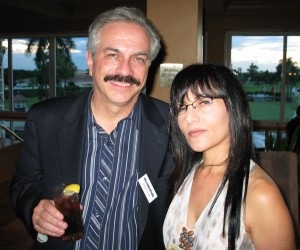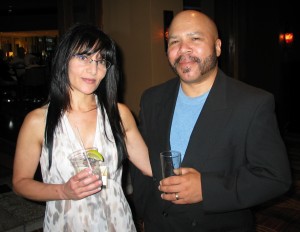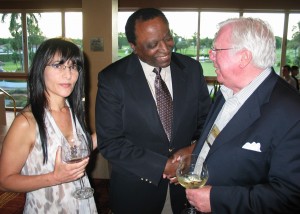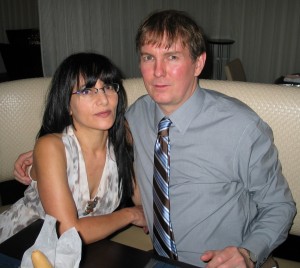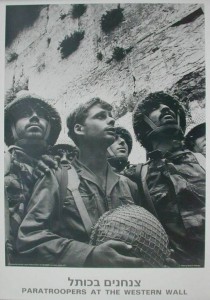After nine years with WND, it was time to meet the people who have been brave enough to showcase my column for that duration; the people who patiently field my (weekly) pedant’s requests for this or the other editorial correction.
Unfortunately, I was unable to stay for the duration of the WorldNetDaily 2010 Conference, which was held at the Doral Golf Resort & Spa, in Miami. This was the case because my mother is visiting with us from The Netherlands, and was home birdie-sitting all alone on Yom Kippur.
“WND And Me” sums up the role of WND in my career, such as it is.
Never, “in all my years with WND.com, the Internets leading, largest independent website,” have I so much as been censored—not even when, in July of 2003, I likened Bush’s ‘Bring ’em on grin’ to the grimace ‘on the face of a demented patient with end-stage syphilis.'”
WND’s intrepid editors have fielded many a missive demanding I be dropped. ‘Guys,’ complained one devotee, “I am about to boycott your splendid website…Ilana’s views are just too … out of sync with other contributors on your site [when it comes to the invasion of Iraq].” What the reader failed to comprehend was that WND was not looking for conformity—at least not from me. And for that I am grateful. I am temperamentally not suited to obedience, not when truth is at stake.
Here I am with the gifted Albert Thompson (already a dear friend), who practically ran the event, and WND’s lovely young book editor, Megan Byrd:
With Joseph Farah at the WND cocktail party.
With the one-and-only Erik Rush, who, I discovered, is also a gifted musician
Jerome Corsi and former Assistant Secretary of State, Alan Keyes.
Dining out with Sean.
UPDATE I (Sept. 19): Snapshots From The Journey.
I am giving in to hyperbole, but when the large African-American woman—employed by the American taxpayer to torment the same subjects at the airport—summoned me with a crooked finger for a pat down, I thought of the film “Midnight Express.” And in particular, the scene where Billy Hayes’ far-from-delightful Turkish jailer schemes to enjoy some time alone with the young American.
America’s airports are ugly places, where statism interfaces with the squalor of mass society. The workforce at the nation’s airports is, mostly, a malicious, affirmatively appointed contingent of minorities, mainly imported. All speaking Pidgin English, and each one singularly focused on exacting revenge on thinner, richer, paler, perceived oppressors.
The poor are first to complain about capitalism, but it has given them cheap travel (and cheap everything else). Once-upon-a-time a trip was a special occasion. You dressed in your finest for it. Now, every tom, dick and harry can afford to fly. Thus the airport’s often-inhospitable waiting lounges are filled with the detritus of humanity; slack-jawed youths talking at the top of their voices, or texting feverishly, mouths agape. Or shamelessly scenting the ether with the orificial end product of nasty food. (Yes, I kid you not.)
Everywhere apparent are “women lost to shame,” to use Edmund Burke’s description of the new breed of woman loosed upon humanity by the Jacobin forces of the Revolution in France. I refer to the kind that spills out of her hot pants and blouses and carries on like a harlot.
A tea shirt popular at the Miami International Airport was one that read, “Miami Bitch.” Many women had voluntarily donned this thing, and it was the cause of much guffawing among them. In “Idiocracy” mode, a semantic trick achieved with vowels elicited a lot of laughter.
Of course, one does see the odd lady among the feral females.
Miami: From the little I saw of it, Miami is a hellishly hot, flat, hellhole. I can see why Tom Tancredo called Miami a Third World place. English is not a first language there. The word that encapsulates that spot’s work ethic is “mañana”: tomorrow.
What can one add about those unpleasant, ugly, old flight attendants? That profession too was once the preserve of females young, pretty and single, who got the opportunity to see the world. By the looks of it, youth and pulchritude are exclusionary criteria; banished, except, I am told, on airplanes flown by China, Singapore and Dubai.
When we emigrated from South Africa to Israel I was a little girl. I remember being awed by the beauty and gentility of the El Al airhostesses. These days, a look from the Delta flight attendants, all in their dotage, is enough to unsettle the most seasoned traveler.
UPDATE II (Sept. 21): These images have now been added to the gallery.


